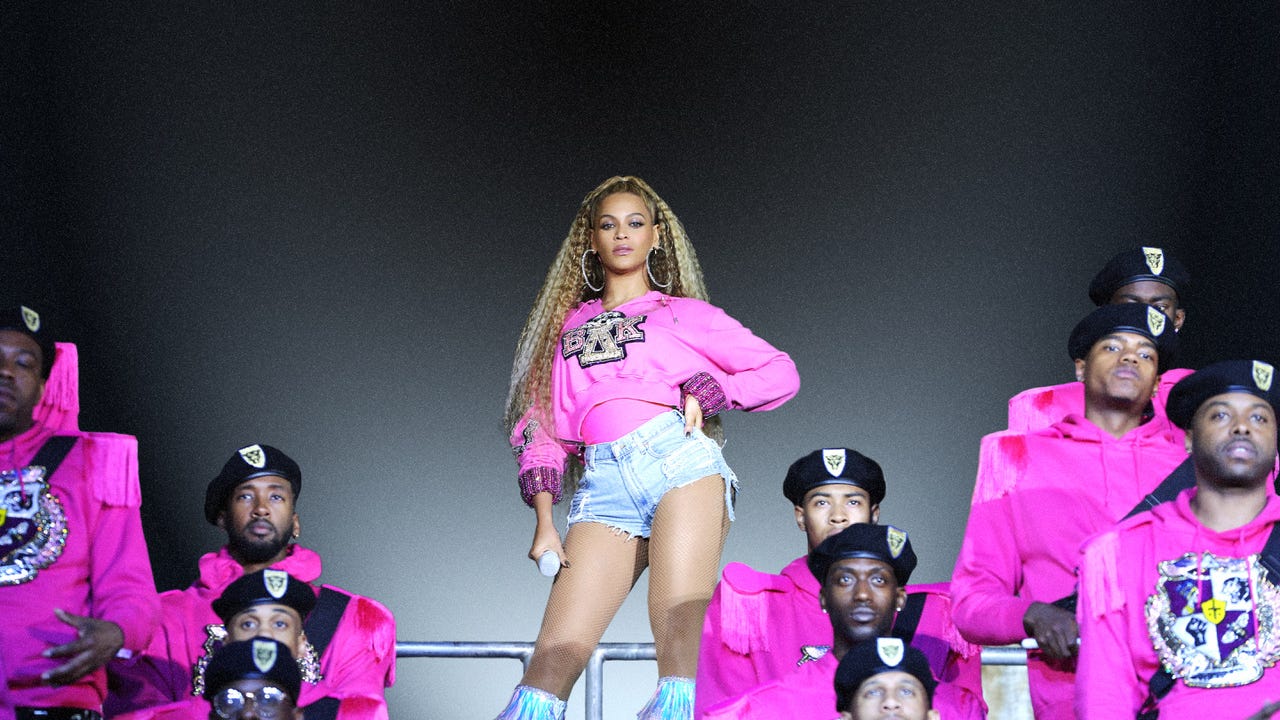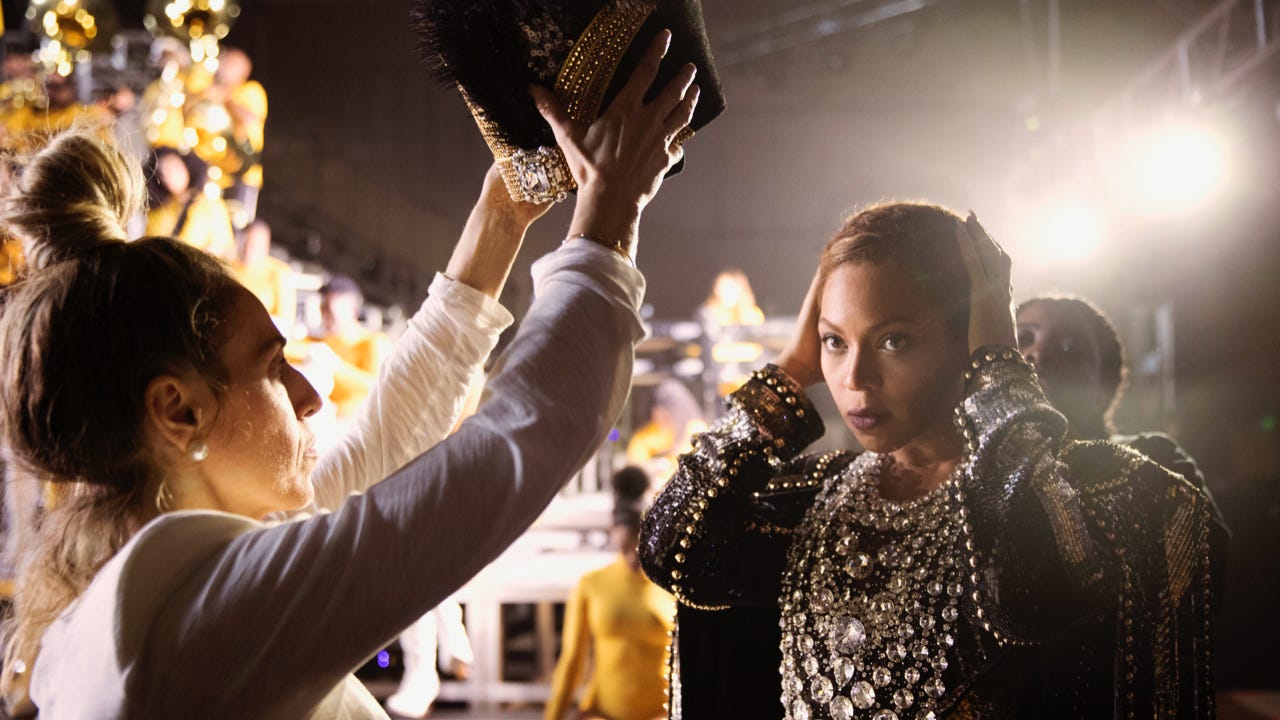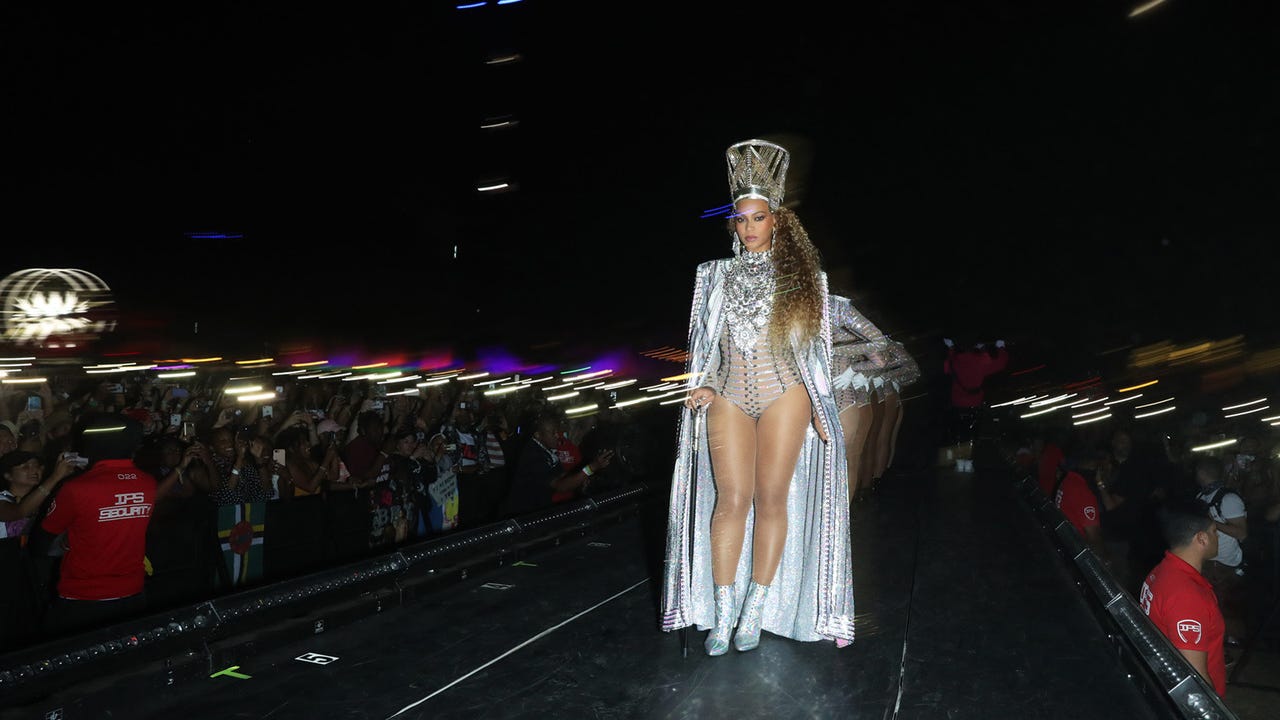Join or Sign In
Sign in to customize your TV listings
By joining TV Guide, you agree to our Terms of Use and acknowledge the data practices in our Privacy Policy.
Homecoming Offers a Rare Glimpse at a Vulnerable (But Still Superhuman) Beyoncé
Beyoncé is beyond striving for perfection
Let's get this out of the way: Beyoncé Knowles-Carter has cemented her place as one of the world's greatest entertainers. If you can watch Homecoming: A Film by Beyoncéand still question her dedication or work ethic, you are willfully ignoring every piece of evidence in the documentary. You do not have to be a member of the Beyhive to recognize Queen Bey as one of the hardest working people in music. The 2018 Coachella performance detailed in the film serves not only as a tribute to HBCUs (historically black colleges and universities), but also as proof of Beyoncé's evolution as a performer and a woman.
Beyoncé's Homecoming Has Arrived on Netflix, and the Beyhive is BUZZING
Homecoming opens with a quote from Toni Morrison's novel Song of Solomon: "If you surrender to air, you can ride it." Throughout the film, via voiceover, Beyoncé mentions learning to love imperfections and mistakes, letting go of rules and being in the moment, being more aware of her body and its personality, and wanting more than just hitting the technical marks in rehearsal. What comes across is that Beyoncé no longer seems interested in perfection, which once drove her aesthetic (as seen in Beyoncé: Life Is But a Dream, her 2013 documentary). Now, Beyoncé wants to give a good show while honoring her culture and legacy, its tragedies and accomplishments -- past, present, and future.

As far as concert films go, Homecoming is not particularly innovative. While more time spent on costuming and the significance of the various styles of choreography could have pushed Homecoming into a groundbreaking concert doc, what it does offer -- in the typical format of grainy black-and-white rehearsal footage mixed in with performer confessionals, plus the actual concert itself -- is how unapologetically black Beyoncé wanted this Coachella performance to be. Beyoncé herself is what's innovative about this concert doc. She honors HBCUs and the diversity of blackness, highlighting different styles of dance and music, as well as different body types, all in one performance. At one point, she says she wanted the show to feel like a Battle of the Bands, something that was an exciting part of her childhood, and that she wanted to put every mistake and every accomplishment of her 22-year career into it. Watching how Homecoming came together, one can see that Beyoncé is surrendering to air, her own legacy, and learning to ride it. She is not the same person she was when her career began, and she doesn't have to operate in the same way.
Find your new favorite show: Watch This Now!
Beyoncé was supposed to headline Coachella in 2017, but her pregnancy with twins at the time prevented it. In Homecoming, we learn that Beyoncé experienced a difficult pregnancy. While carrying her twins, she dealt with high blood pressure, toxemia, and pre-eclampsia, and because one of the babies began having issues with their heartbeat, she had to deliver via emergency C-section. Beyoncé reveals that returning to the stage after giving birth to Sir and Rumi was a different type of homecoming for her. She could no longer endure 15 consecutive hours of practice. She had to be mindful of her body and health, plus take care of her family.
At one point in Homecoming, we see a moment when Beyoncé has to sit down because she thinks she may pass out. Jay-Z massages her belly and torso when the physical toll becomes too much for her. We didn't see those moments of physical imperfection from Beyoncé in Life Is But a Dream. We saw her dealing with scheduling glitches or technical difficulties with the show, and while she mentioned feeling unwell at the start of her pregnancy with Blue Ivy, we didn't see her dealing with any weaknesses of the body. However, in Homecoming, Beyoncé shows fans that she, too, breaks down. She admits her strict diet leaves her hungry. This all goes back to her wanting to celebrate and honor the messy moments of her craft.

The concert footage from Life Is But a Dream was extremely polished and almost entirely focused on Beyoncé, with very few shots of the audience reactions. But Homecoming delivers frequent looks at the audience, with particular attention to the black women in attendance. They are singing along with Beyoncé, reaching out for her, open-mouthed in awe at what they're watching. Beyoncé acknowledges the festival-goers, speaks to them, teases them. In Homecoming, we see the symbiotic relationship between Queen Bey and her hive. They feed each other. Beyoncé says more than once, "I see you," and it's clear that she does.
Throughout the film, there are interstitial quotes from notable black figures like W.E.B. DuBois, Alice Walker, Marian Wright Edelman, and more. We hear the wisdom of Nina Simone and Maya Angelou. Tessa Thompson and Danai Gurira make voiceover appearances. Beyoncé was the first black woman to headline Coachella, and she wanted to make sure she put a significant part of black American culture on stage for the world to see. She wanted to give her performers "a free, safe space where no one was marginalized." At one point, Beyoncé admits she never again wants to push herself the way she pushed herself to get ready for Coachella, and honestly, she doesn't have to any more. She no longer has anything to prove. In Life Is But a Dream, she had to prove she could have a career without her father as a manager, and there was little room for mistakes. In Homecoming, she embraces mistakes and has learned that joy can be found in sacrifices.

Beyoncé's 2018 Coachella show will remain a historical moment. There should be no doubt that Queen Bey is the consummate performer. She's one of the hardest working artists in the industry. If anyone can look at Homecoming and still question her dedication or the love she has for her cultural history, well, they refuse to face facts. Early in the documentary, Beyoncé admits she always wanted to go to an HBCU but her stint in Destiny's Child was her college education. Homecoming shows that she is still learning, not only about the history of her people, but also about her own legacy and what it means to let go and give in to who you are.
Homecoming is now available to stream on Netflix.